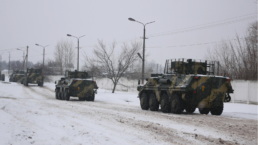Katrina vanden Heuvel, The Nation publisher and Russia expert discusses the origin of the crisis and possible ways out of it.
By Nathan J. Robinson, Current Affairs
Katrina vanden Heuvel is the editorial director and publisher of The Nation magazine, as well as a columnist for the Washington Post. She is the president of the American committee for U.S.-Russia Accord and a member of the Council on Foreign Relations. For years, she’s written on Russian affairs, and has recently been writing editorials on the origins of the current crisis in Ukraine and possible paths out of it:
- What A Sensible Ukraine Policy Would Look Like (Jan. 4, Washington Post)
- Stop The Stumble Toward War With Russia (Jan. 18, Washington Post)
- The Exist From The Ukraine Crisis That’s Hiding In Plain Sight (Feb. 1, Washington Post)
- A Path Out of the Ukraine Crisis (Feb. 15, Washington Post)
- Putin’s Invasion (Feb. 24, The Nation)
- We Must End The War on Ukraine—and Put an End To Perpetual Wars (March 1, Washington Post)
- War and Peace in Ukraine (March 3, The Nation)

She recently joined editor in chief Nathan J. Robinson on the Current Affairs podcast. This interview has been lightly edited and condensed for grammar and clarity.
ROBINSON
In the lead up to Russia’s invasion of Ukraine, you wrote a number of columns in which you warned that the United States could be stumbling toward either a proxy war with Russia, or a direct war with Russia. And you were cautioning that American diplomatic decisions—or the lack of American diplomacy—was inflaming a very tense situation. Let’s lay out some of that context. But first, I want to ask you: When Russia ultimately did invade Ukraine, were you surprised? Did you see this as the logical outcome of a process that had been unfolding in slow motion? Or was it still something completely unexpected and out of the blue in some ways?
VANDEN HEUVEL
Thank you for mentioning the American Committee for U.S.-Russia Accord. Ambassador Jack F. Matlock is a member of the board. He was Reagan’s ambassador to the USSR, and he presided over the beginning of the end of the Cold War. He was shocked. He spent decades studying Russian language and history and working in Russia. Many people were shocked. Anatol Lieven, a very important voice who wrote a major article for The Nation a few months ago on Ukraine—he’s at the Quincy Institute, a new institute designed for restraint diplomacy—he was shocked. And many of the people on our board who are professional Russia watchers and Ukraine scholars were shocked. There was a belief that Putin was amassing all this weaponry to leverage more diplomacy, or perhaps to leverage an agreement in which Ukraine would be a neutral buffer between east and west. I could go on. The shock is real and was real. And I think Putin has undermined Russian security with this act. It’s illegal and indefensible. There’s something really ill-considered—bloody, of course—and illogical in what he did. “Miscalculation” is the word many use as they report on the Kremlin and what is happening in the corridors of power. Among well-established veteran journalists, Russian and American and British, there’s shock.
ROBINSON
The week before the invasion I interviewed Patrick Cockburn, a reporter I respect immensely. I asked him, Is Russia going to invade Ukraine? And he said, Absolutely not. He said it would be a catastrophe.
VANDEN HEUVEL
Yeah.
ROBINSON
He said, think of the U.S. occupation of Vietnam, think of Iraq. And he said, Putin’s aware of this. So Cockburn was completely taken by surprise, as was every respectable analyst I’ve been reading on the issue. So it raises the question. What is Putin thinking that he’s doing here?
VANDEN HEUVEL
So, Putin’s speech was a grave concern to many scholars and watchers of Russia. He didn’t begin with NATO, which we can talk about. He began, first of all, by attacking Lenin, and I think Stalin, for their nationality policies. He’s known, by the way, to have attacked Lenin for other reasons. There’s the mythic idea of recreation not of the Soviet Empire, but of the Slavic empire—Ukraine, Belarus, Russia—and NATO. I think there are two precipitating factors, but who knows? Based on well-regarded reporters, in the corridors of power, Putin is viewed as increasingly isolated. He’s been very paranoid about the COVID pandemic. You could see it in the size of the table in which he met Emmanuel Macron and others—30 feet.
Recent Posts
‘Unconstitutional. Unethical. Authoritarian.’ ICE Bars Millions Of Immigrants From Bond Hearings
July 18, 2025
Take Action Now One watchdog said the new policy “seems like a blatant attempt to stop them from exercising their right to due process.”……
Americans Are Not Nearly Alarmed Enough About Climate Change
July 18, 2025
Take Action Now Americans still don’t comprehend how imminent, dangerous, and far-reaching the threat is—and journalists are partly to blame.By…
The IRS Is Building A Vast System To Share Millions Of Taxpayers’ Data With ICE
July 17, 2025
Take Action Now ProPublica has obtained the blueprint for the Trump administration’s unprecedented plan to turn over IRS records to Homeland Security…
Israel’s Sudden Assault On Syria Is Unchecked Aggression
July 17, 2025
Take Action Now Jerusalem is bombing Damascus and threatening al-Sharaa’s rule, while Washington was hoping to help the nascent government on…




